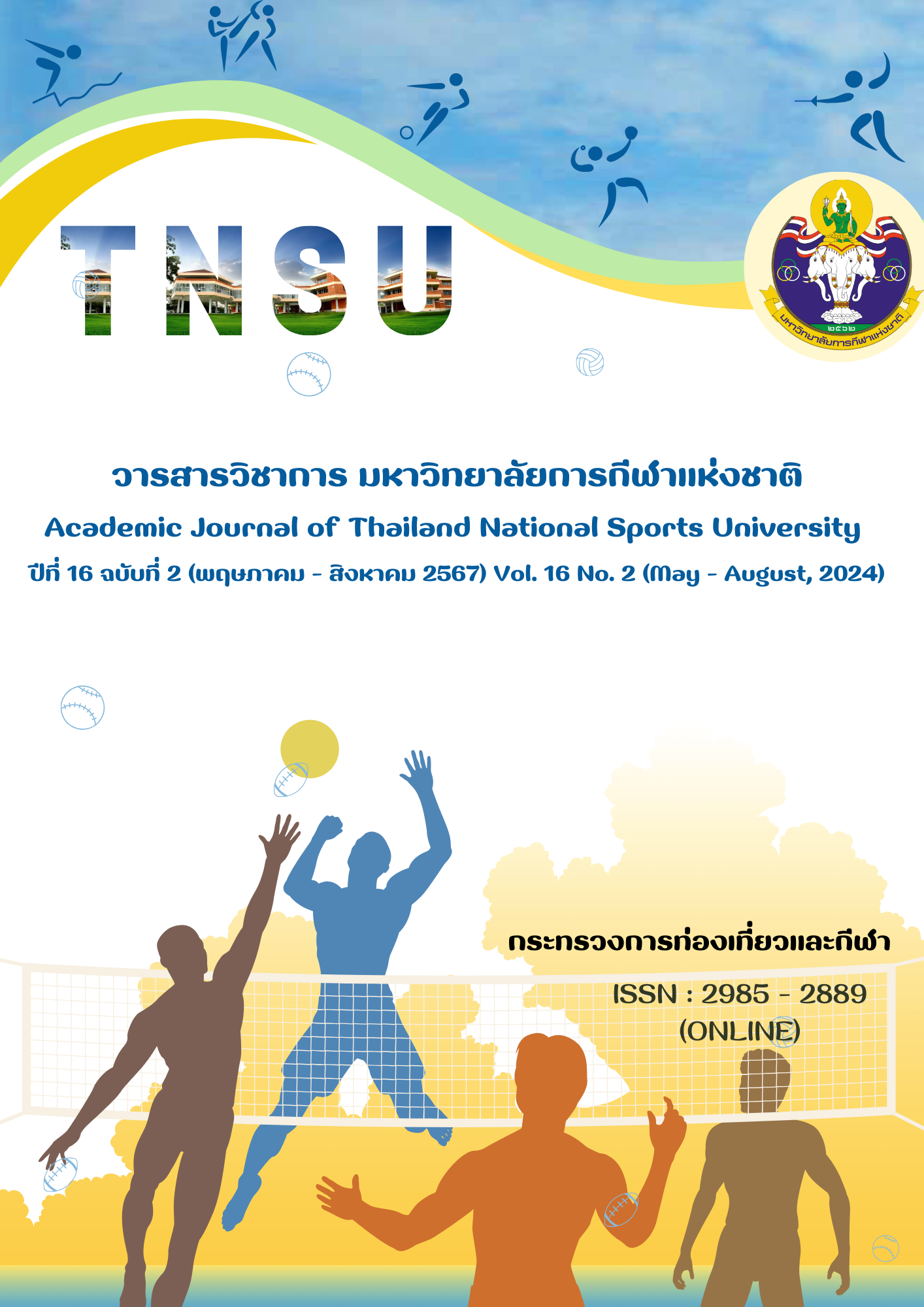EFFECTS OF PHYSICAL EDUCATION ACTIVITIES USING MOTIVATION THEORY WITH TEAMWORK ON PEER RELATIONSHIP FOR SECONDARY SCHOOL TEAM ATHLETES
Main Article Content
Abstract
The objectives of this research were:- 1) to compare the mean differences of peer relationship scores before and after the experimental group of students, and 2) to compare the mean difference of peer relationship scores after the experiment among the experimental group of students who received physical education activities to enhance the relationship between peers by using the theory of motivation and teamwork and control group who received regular sports training. The sample group was students. 40 junior high school students who are football players of the school, male, aged between 13-15 years old, junior high school level. The sample was drawn from purposive selection. While the selection criteria consisted of 20 experimental groups and 20 control groups. Research tools included physical education activities using motivation theory combined with teamwork to build relationship between peers and a relationship assessment form between friends. The experimental group received physical education activities using the theory of motivation and teamwork for 60 minutes each session, twice a week , for 8 week. The statistics used in data analysis were mean, standard deviation and t-test statistical significance level .05. The study found
1) After the experiment, the students in the experimental group who received the physical education activities to enhance the relationship between peers using motivation theory and teamwork had higher peer relationship score than before the experiement. at the statistic of .05 level
2) The students in the experimental group who received physical education activities to enhance relationship between peers using the theory of mutual motivation and teamwork had higher relationship scores among peers than the control group students who received regular soccer training after the experiment. at the statistic of .05 level
Article Details

This work is licensed under a Creative Commons Attribution-NonCommercial-NoDerivatives 4.0 International License.
The published article is a copyright of the Academic Journal of Thailand National Sports University. The passage appeared in each article in this academic journal is a perspective of each author which is not related to the journal. Each author is required to be responsible for all components of his/her own article. If there are any mistakes, each author must be responsible for those mistakes on his/her own.
References
Department of Physical Education. (2021). Youth and public football competitions. Bangkok: Department of physical Education, Ministry of Tourism and Sports.
Keadsuda Intaraosot. (2003). The effects of assertive behavior training on interpersonal relationships of secondary school students of Ban Klong Sam (darun suksa) school in Changwat Nakhorn Nayok (Master’s Thesis), Srinakharinwirot University.
Ladd, G. W. (1999). Peer relationships and social competence during early and middle childhood. Annual review of psychology, 50(1), 333 – 359.
Ministry of Tourism and Sports. (2017). National Sports Development Plan No. 6 (2017 - 2021). Bangkok: Office of the Permanent Secretary, Ministry of Tourism and Sports.
Naruchol Orrachorn, Paradee Srilad, & Suthana Tingsabhat. (2018). Effects of small-sided games training program on soccer ball passing and receiving ability of lower secondary school students. Journal of Education Chulalongkorn University, 13(4), 13 – 26.
Parker, J. G., Rubin, K. H., Erath, S. A., Wojslawowicz, J. C., & Buskirk, A. A. (2006). Peer relationships, child development, and adjustment: A developmental psychopathology perspective. In D. Cicchetti & D. J. Cohen (Eds.), Developmental psychopathology, Theory and method, 2(1), 419 – 493.
Peechanika Pechsung, Aumporn Makanong, & Duchduen Bhanthumnavin. (2020). Development of program for enhancing learning behavior using achievement motivation theory and goal setting theory for undergraduate students. Journal of Education Naresuan University, 23(2), 433 - 435.
Penpicha Lwandee. (2013). Job motivation and job satisfaction among nurses in banphaeo hospital public organization (Master’s thesis), Silpakorn University.
Pongake Sooksai. (2005). A training program for improving the anaerobic threshold of football players (Master’s Thesis), Chulalongkorn University.
Pongpinit Promnet. (2020). Effects of volleyball group dynamic program on teamwork and volleyball skills vocational students (Master’s thesis), Chulalongkorn University.
Sumeth Ponggpetra. (2010). Factors affecting on interpersonal relationship with friends of the fourth level, secondary grades 4 – 6 students at Sarasas Ektra school in Yannawa district, Bangkok (Master’s thesis), Srinakharinwirot University.
Tanrada Kaewkunha. (2019). Effects of a self - disclosure program on peer relation and collaborative working skill ls of third grade student (Master’s thesis), Chulalongkorn University.
Tarricone, P., & Luca, J. (2002). Successful teamwork: A case study. American Journal of Educational Research, 3(6), 641 – 645.
Wasinee Mukdokmai. (1998). A comparison of the effects of group work and assertive training on relations with peers of elementary school grade 6 students of Chumchongbungba school in Amphoe Nongsua Changwat Pathum Thani (Master’s thesis), Srinakharinwirot University.
Wasu Sakulrat. (2014). Effect of non - formal education activity management using the cooperation of people from different ages in the art activities on interpersonal relationship enhancement (Master’s thesis), Chulalongkorn University.
Wittaya Boonladee. (2018). Factors affecting self - development on teachers under prachuapkhirikhan primary educational service area office 2. Veridian E - journal, Silapakorn University, 11(3), 2513 - 2518.
Witthaya Laohakul. (2016). Manual of best practices. Samthuraprakarn: Pathach.
Worasak Pianchob. (2005). Collection of articles on philosophy, principles, teaching methods and measurement for evaluation in physical education. Bangkok: Chulalongkorn University Press.


